Fostering customer relationships: How retailers can use pool cleaners to increase profits
by Samantha Ashenhurst | January 11, 2019 4:37 pm
By Jamie Novak
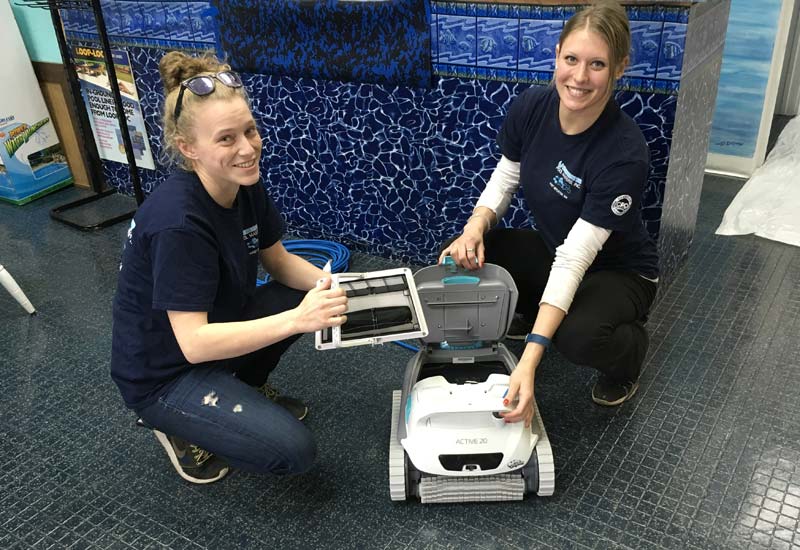 [1]
[1]Most retailers understand the value of creating a unique experience for their customers. Customization is an excellent way for small business owners who are looking to differentiate their products from those of big-box competitors.
For years, aquatic retailers have used this strategy when selling pool and spa water treatment packages—but why not use this same approach in regards to a customer’s cleaning system? This level of customization, which caters to the individual needs of a pool owner, can assist in building customer loyalty and ultimately increase profits. However, what should specialty retailers consider when drafting a sales plan that includes a customized approach to selling pool and spa cleaners to best increase sales in 2019?
Establishing customer relationships
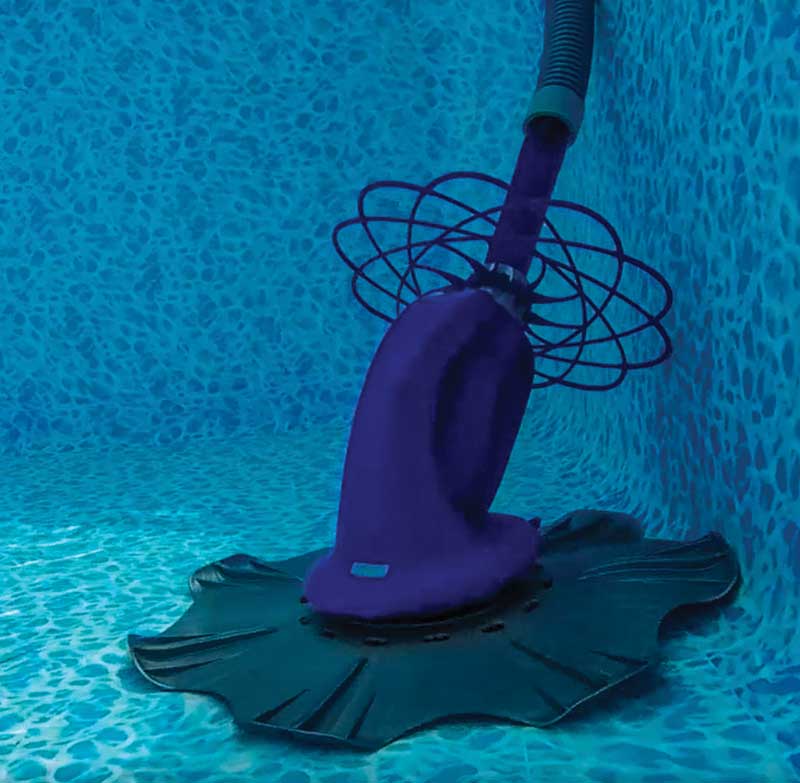 [2]
[2]When homeowners are first introduced to the many steps necessary to properly maintain a pool, they are sometimes overwhelmed by the amount of work involved.
Automatic cleaners offer a solution to owners who have limited amounts of time to spend working on their pools. Thus, explaining different device options early on in the process can ensure a customer is happy with their purchase and also help build customer loyalty.
Knowing the customer
When creating a customized cleaning system, a retailer must first understand their client’s needs. Specifically, it is vital to establish how the pool is used, what kind of debris falls into the water, and how involved the owner wants to be in regards to cleaning.
After a retailer gets to know their customer, it becomes easier to suggest a cleaner to best suit their needs and budget. Taking the time to make the sales experience more personal opens up the possibility for additional sales and services.
Develop a checklist
When customizing cleaning systems, it helps to provide staff members with a written list of questions to ask the client. They should start with some basic inquiries about the pool’s location and environment, as this will help identify the customer’s basic needs.
Such questions might include:
- What type of debris is making the pool dirty?
- Is the customer dealing with leaves, acorns, pine needles, or dust?
- Is the installation in a windy area?
- Does it have an automatic cover?
- Is the pool enclosed?
- Does it have a booster pump?
- What type of filtration system is installed? How often is it cleaned?
- Is the pool winterized and uncovered during cold months?
Ultimately, the ideal choice for a particular customer boils down to the needs of the pool, how much work the owner wants to put in, and the price of the cleaner.
Discussing customizable options
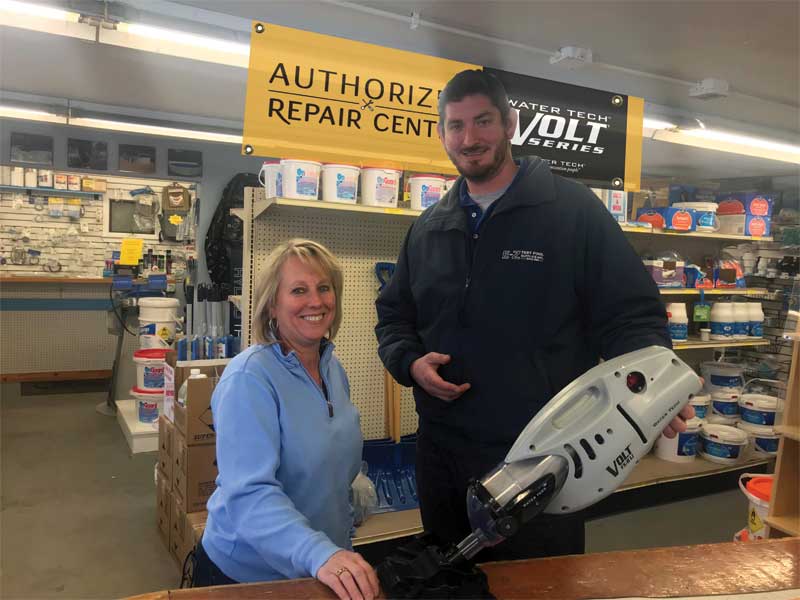 [3]
[3]Once there is an established idea of what the cleaner will be doing, it is easier to suggest a suitable option for an individual customer’s pool. It is preferable to present several options with a range of price points, as this will help further tailor the product to suit the client’s needs.
Depending on the type of debris noted in the water, retailers might suggest a suction-side, pressure-side, or robotic pool cleaner.
Suction cleaners
Offering a lower price point compared to other automatic cleaners, suction-side devices are among the most commonly installed systems. They are simple to install, user-friendly, and often included in new-
build packages as an affordable introduction to automatic cleaning.
Adept at catching smaller debris, these installations are particularly popular in the Sunbelt region in the southern U.S. where many pools are screened-in and protected from large falling items, such as branches or leaves. The debris is collected and then transported to and stored within a skimmer basket, which must be emptied. While an ideal option for hands-on or ‘do-it-yourself’ homeowners, these installations are not for everyone, as many clients are not willing to manually clean out a skimmer basket.
Pressure cleaners
Carrying a ‘middle of the road’ price tag, pressure-side cleaners are a popular option for homeowners who have bigger pools and/or live in areas with large pieces of falling debris (e.g. leaves, acorns, twigs, etc.). Most of these devices operate off of a separate booster pump, which gives them more power to move throughout the pool. They also have an adjustable head, which further controls how they are able to move through the water. The collected debris is contained in a bag at the cleaner head. This detachment from the filtration system prevents the risk of a clogged skimmer, which sometimes occurs in suction-side installations.
Robotic cleaners
Falling at the higher end of the pricing structure, a robotic pool cleaner is just as it sounds: a low-voltage, electric-powered device that runs through a pool and sucks up debris into a self-enclosed compartment. Unlike suction- and pressure-side cleaners, robotic devices operate independent of the pool system and can run while the pump is completely shut off. Since its conception, many ‘bells and whistles’ have evolved within this category, including remotes for controlled steering abilities, multiple clean cycle settings, and hand-carts for transportation and storage.
 [4]
[4]This category of cleaners is popular among Canadian consumers, especially as these devices have experienced a decrease in price in recent years. Some stores, including Winnipeg-based aquatics retailer Aqua-Tech Pool Spa and Bath, have seen such a significant surge in sales they have stopped carrying other types of automatic pool cleaners.
“We only stock robotic pool cleaners in our store,” says store manager Kathi Belcourt. “We find they provide the best performance and return on investment (ROI).”
Tom Landi of New Jersey-based Landi Pools and Games agrees pool owners are wise to consider a robotic cleaner. He makes an effort to educate his customers whilst upselling, adding these devices are among the easiest and most profitable products he sells.
“Many consumers are looking for ‘green’ pool products,” says Landi. “My staff members explain that robotic systems keep the filter cleaner, so they won’t have the backwash the filter as often, which reduces water and energy consumption, as well as their overall costs.”
Russell Koch of Backyard Vacations Pool and Equipment in Medicine Hat, Alta., says more than 50 per cent of his clients who watch him service their pool using an automatic cleaner opt to purchase a unit from him. He says he is happy to sell them the system, as he is able to maintain a relationship with the client for other services.
“To prevent them from going to the Internet to buy a cleaner, we service any unit we sell,” says Koch.
Add-ons
Often sold in conjunction with automatic cleaners, hand-held battery-powered devices offer a convenient option for customers interested in cleaning specific areas of their pools—especially in areas where there is a lot of sand or dust in the air that settles in the water.
“We have sold a lot of hand-held vacuums in our store because owners saw our service technicians using one to clean their steps,” said Chris Morelli of South Strand Pools in South Carolina. “Stairs always have junk on them and homeowners want to do spot cleaning.”
Customize with combination solutions
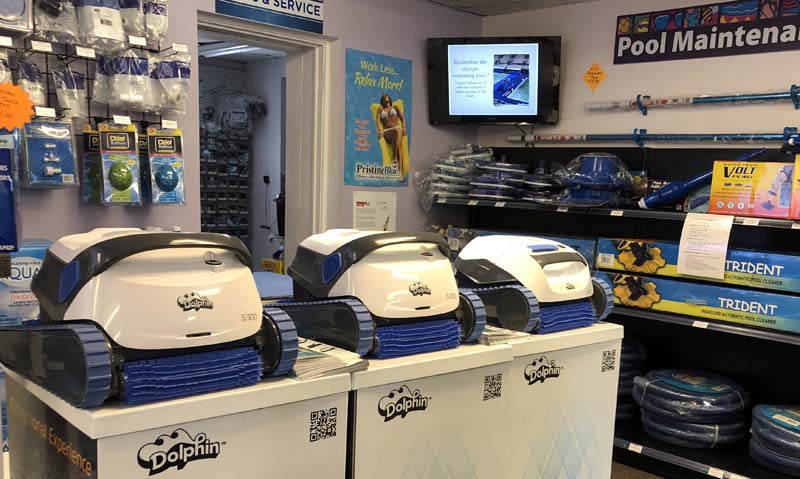 [5]
[5]Offering a customized pool cleaning solution does not end with the sale of a pool cleaner. Retailers should consider complementing the sale of these devices with a specialized offer (e.g. the inclusion of a certain number of repairs), as any differentiation from mass merchant offerings deviates from competing on price alone.
Retailers should also be prepared to offer additional specialized options as a way to further standout from the competition and offer customers a fully customized cleaning package.
In-store repair
In-store service and repair is growing in popularity among specialty retailers. Authorized warranty repair is preferred by many consumers instead of having to ‘send out’ their cleaner, which interrupts the functionality of their pool. Also, bringing a customer into the store on a regular basis increases the chance of an additional sale, both for spontaneous and big-ticket items.
“Our store is happy to order parts for any cleaners, even those purchased at big-box stores,” says Belcourt. “By offering in-store repair of pool cleaners, our shoppers become very loyal customers.”
Landi agrees and says in-store repairs are an important aspect of selling a cleaner.
“We warranty and repair all cleaners we sell,” he says. “Offering in-store repair is a service that distinguishes us from big-box and Internet retailers.”
Valet services
Similar to options provided by automobile retailers, the sale of a pool cleaner could easily include providing customers with a loaner device should the installation require service or repair.
Likewise, valet service can also be viable. This might include going to the customer’s home, removing the malfunctioning unit from their backyard, and replacing it with a loaner cleaner. This service keeps the pool running without interruption and helps in further building customer loyalty.
“We offer free set-up of all our robotic cleaners,” says Belcourt. “We deliver the unit, put it in the pool, and get it started—all for no additional charge.”
Complementary treatments
Providing frequent opportunities to interact with a client allows a retailer to find additional ways to ensure a customer stays ‘in love’ with their pool. Companies should be prepared for any add-on services by regularly suggesting ‘easy upgrade’ options for clients (i.e. e-mail broadcasts, flyers, coupons, promotions, etc.).
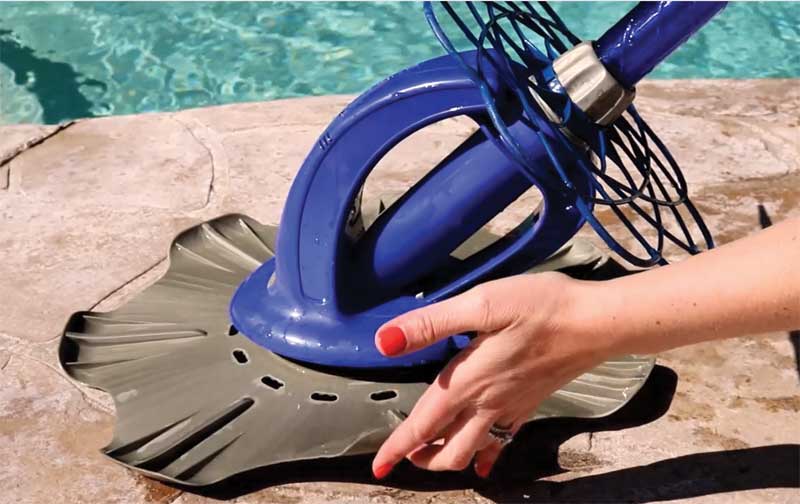 [6]
[6]For example, perhaps a client was unaware of the availability of a new water treatment chemical sold in-store. Retailers can close this communication gap by offering a regular service contract where they treat the customer’s pool with a specialty chemical treatment (e.g. algae prevention and removal) and simultaneously perform a routine service or tune-up on their pool cleaner.
Automation
Automatic chemical feeders can be used for a variety of cleaning applications to keep water consistent and clear. After all, enzymes dosed throughout the course of the day are akin to cleaning up in the middle of a party.
If a company offers automation systems that can be linked to a smartphone app, all employees must be trained on how to install the technology on a client’s phone, and also take the time to teach the customer how to use it. This type of ‘hand-holding’ is an invaluable way a company can set itself apart from big-box retail competition.
“I would say 75 per cent of our customers actually ‘name’ their robotic cleaners,” says Belcourt. “Robotic cleaners become members of the family—the clients love them that much.”
Conclusion
Differentiation through customization of a pool cleaning system allows specialty retailers to charge a premium and enjoy higher profits.
When working with an existing pool, a retailer should take the time to learn about a client’s previous experience and ask what they liked and disliked about it. This is a solid starting point for tailoring a cleaning solution specific to a customer’s needs, whether these needs involve an automatic cleaner or water treatment solution to keep their pool water looking beautiful year-round. Taking the time to guide a customer through the available options is another way in which companies can set a store apart as an expert and knowledgeable pool supplier.
 [7]Jamie Novak is a brand manager at NC Brands, parent company of Natural Chemistry, SeaKlear, and Coral Seas specialty chemical products. She has more than 13 years of pool industry experience and previously worked as a robotic pool cleaner specialist. Novak can be reached via e-mail at jamie@ncbrands.com[8].
[7]Jamie Novak is a brand manager at NC Brands, parent company of Natural Chemistry, SeaKlear, and Coral Seas specialty chemical products. She has more than 13 years of pool industry experience and previously worked as a robotic pool cleaner specialist. Novak can be reached via e-mail at jamie@ncbrands.com[8].
- [Image]: https://www.poolspamarketing.com/wp-content/uploads/2019/01/opener.jpg
- [Image]: https://www.poolspamarketing.com/wp-content/uploads/2019/01/Orbit-in-action.jpg
- [Image]: https://www.poolspamarketing.com/wp-content/uploads/2019/01/Customer-With-Handheld-Cleaner.jpg
- [Image]: https://www.poolspamarketing.com/wp-content/uploads/2019/01/crop.jpg
- [Image]: https://www.poolspamarketing.com/wp-content/uploads/2019/01/crop_store.jpg
- [Image]: https://www.poolspamarketing.com/wp-content/uploads/2019/01/Courtesy-NCBrands-RedLeopard-orbit3.jpg
- [Image]: https://www.poolspamarketing.com/wp-content/uploads/2018/03/Novak_Headshot.jpg
- jamie@ncbrands.com: mailto:jamie@ncbrands.com
Source URL: https://www.poolspamarketing.com/trade/features/fostering-customer-relationships-how-retailers-can-use-pool-cleaners-to-increase-profits/